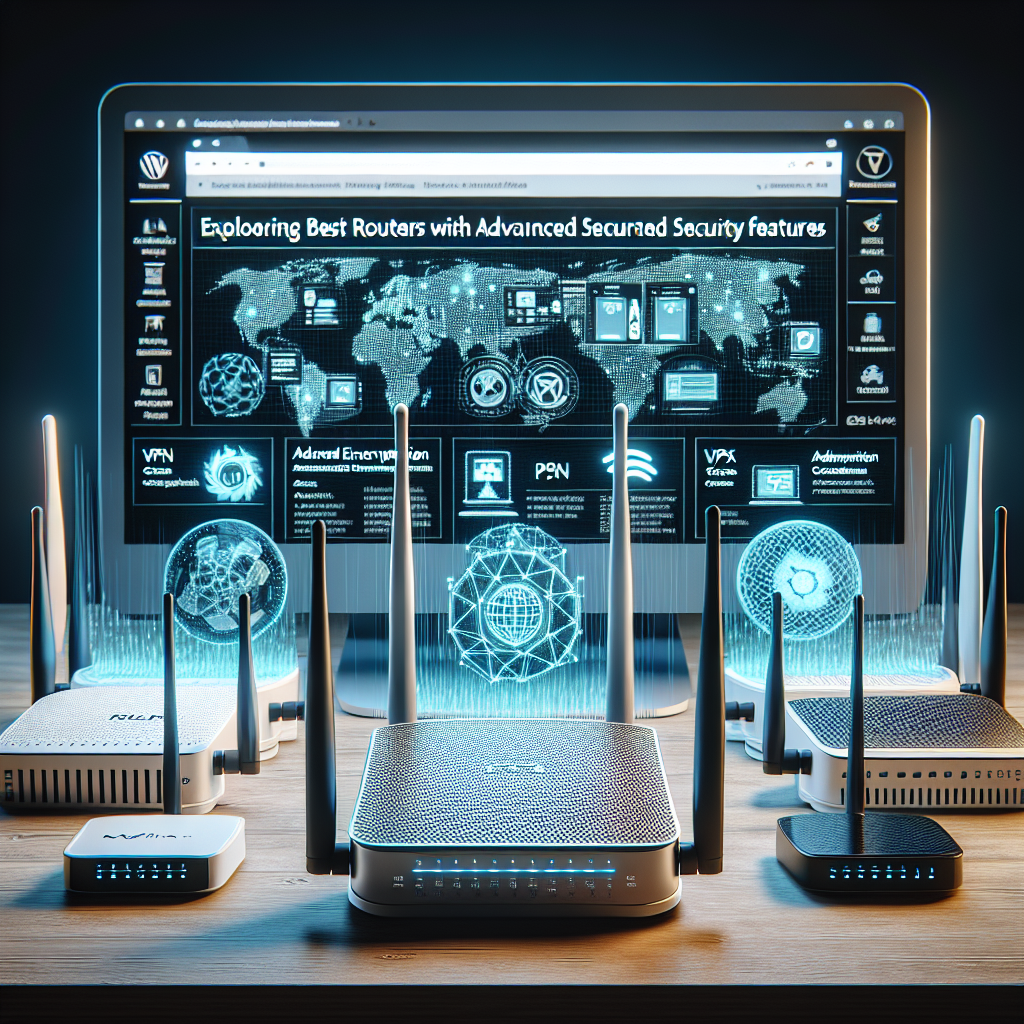In today’s interconnected world, the importance of robust security measures cannot be understated. When it comes to safeguarding your network from cyber threats, having a router with advanced security features is crucial. From built-in firewalls to real-time threat protection, these cutting-edge routers offer a comprehensive defense against hackers and malware. In this comprehensive guide, we will delve into the best routers on the market that prioritize security, providing you with peace of mind as you browse, stream, and work online. Join us as we explore the latest innovations in router technology and discover the top options for enhancing the security of your network.
Understanding the Importance of Advanced Security Features in Routers

In today’s interconnected world, the importance of advanced security features in routers cannot be overstated. These features play a crucial role in safeguarding personal and sensitive information from malicious cyber threats. Here are some key points to consider:
- Preventing Unauthorized Access: Advanced security features such as robust encryption protocols and secure authentication mechanisms help prevent unauthorized access to your network. By creating barriers to entry, these features ensure that only authorized users can connect to your router.
- Protecting Against Malware: Routers with advanced security features often come equipped with built-in malware protection capabilities. These can help detect and block malicious software that may attempt to infiltrate your network, thereby preventing potential data breaches and cyber attacks.
- Securing IoT Devices: With the proliferation of Internet of Things (IoT) devices in homes, having advanced security features in routers is essential to secure these connected devices. By implementing features like network segmentation and device isolation, routers can prevent compromised IoT devices from compromising the entire network.
- Enhancing Privacy: Advanced security features in routers also contribute to enhancing user privacy. Features such as VPN support and DNS filtering can help users maintain their anonymity online and protect their browsing habits from prying eyes.
In summary, the incorporation of advanced security features in routers is paramount in the current digital landscape to mitigate the evolving threats posed by cybercriminals and ensure the overall security and privacy of home networks.

Key Considerations When Choosing a Router with Advanced Security Features
Security Protocols and Encryption
- WPA3 Protocol: The latest in Wi-Fi security, offering stronger encryption and protection against brute force attacks. WPA3 enhances data confidentiality and integrity, providing a more secure network environment for users.
- VPN Support: Routers with VPN support enable secure remote access to the network. VPNs encrypt data traffic, shielding it from potential threats and unauthorized access. This feature is crucial for maintaining privacy and security, especially when connecting to public Wi-Fi networks.
- Importance of Encryption: Encryption plays a pivotal role in safeguarding network data. By encoding information transmitted over the network, encryption prevents malicious actors from intercepting and deciphering sensitive data. Robust encryption mechanisms, such as AES (Advanced Encryption Standard), ensure that data remains confidential and secure during transmission.
Firewall and Intrusion Prevention System (IPS)
Firewall technology plays a crucial role in safeguarding networks by analyzing incoming and outgoing traffic and blocking potentially harmful data packets. By establishing a barrier between a trusted internal network and untrusted external networks, firewalls act as the first line of defense against cyber threats. They examine data packets based on predefined security rules and policies, allowing or denying access accordingly.
Benefits of an Intrusion Prevention System (IPS) in router security:
- Real-time threat detection: IPS monitors network traffic for suspicious activities and patterns, promptly identifying and mitigating potential threats before they can cause harm.
- Enhanced security posture: By actively scanning for known vulnerabilities and attack signatures, IPS enhances the overall security posture of the network, reducing the risk of successful cyber attacks.
- Automatic threat response: IPS can automatically respond to detected threats by blocking malicious traffic or isolating compromised devices, minimizing the impact of security incidents.
- Customizable security policies: Administrators can configure IPS settings to align with the specific security requirements of their network, tailoring protection mechanisms to address unique threats and vulnerabilities.
Secure Guest Network and Parental Controls
Setting up a secure guest network on your router provides several advantages, enhancing both the security of your primary network and the convenience for visitors:
- Network Segmentation: By creating a separate guest network, you isolate your primary network from potential security threats that may arise from guests’ devices. This segmentation helps protect your sensitive data and devices from unauthorized access.
- Limited Access: Guest networks typically have restricted access to certain resources on the primary network, such as shared files or connected devices. This limitation ensures that visitors can only access the internet and not other sensitive information.
- Easy Configuration: Many modern routers offer user-friendly interfaces for setting up guest networks, allowing you to create temporary access credentials or time limits for guests. This feature streamlines the process of granting network access while maintaining security.
Parental controls play a crucial role in managing internet usage within a household, especially in households with children or teenagers:
- Content Filtering: Parental control features enable you to filter and block access to inappropriate content, such as adult websites or violent material. This helps ensure a safer online environment for children and promotes responsible internet usage.
- Scheduled Access: With parental controls, you can set specific times when certain devices can access the internet, helping to regulate screen time and establish healthy digital habits.
- Activity Monitoring: Some routers with advanced security features offer activity monitoring tools that allow you to track the online activities of connected devices. This monitoring capability empowers parents to supervise their children’s internet usage and address any concerns proactively.
Automatic Firmware Updates and Vulnerability Patching
Regular firmware updates play a crucial role in ensuring the security of a router. These updates are essential as they address known vulnerabilities and strengthen the overall security posture of the device. When considering routers with advanced security features, the presence of automatic firmware updates is a key factor to prioritize. Here are some details on the significance of automatic updates and vulnerability patching:
- Significance of regular firmware updates in addressing security vulnerabilities
Firmware updates are designed to patch security vulnerabilities identified in the router’s operating system. These vulnerabilities can be exploited by cybercriminals to gain unauthorized access to the device or intercept sensitive information. By regularly updating the firmware, users can stay protected against known security flaws and reduce the risk of cyberattacks.
- How automatic updates enhance router security and protect against emerging threats
Automatic firmware updates streamline the process of applying patches and security fixes to the router. By enabling automatic updates, users ensure that their devices are continuously protected against the latest threats without requiring manual intervention. This proactive approach to security helps in mitigating risks associated with emerging cyber threats and ensures that the router remains resilient to evolving attack techniques.
Comparison of Top Routers with Advanced Security Features
Router A: Features and Security Capabilities
- Advanced Firewall Protection: Router A is equipped with a robust firewall that actively monitors incoming and outgoing traffic, blocking potential threats and unauthorized access attempts.
- VPN Support: This router offers Virtual Private Network (VPN) support, allowing users to establish secure connections over the internet, ensuring data privacy and encryption.
- Intrusion Detection and Prevention System (IDPS): Router A incorporates an IDPS that detects and mitigates suspicious activities, such as malware infections or hacking attempts, in real-time.
- Secure Guest Network: Users can create a separate guest network with restricted access to the main network, safeguarding sensitive data and devices from unauthorized users.
- Regular Firmware Updates: The router manufacturer regularly releases firmware updates to patch vulnerabilities and enhance security measures, ensuring the device remains protected against emerging threats.
- Parental Controls: Router A includes robust parental control features, allowing users to restrict access to certain websites or set time limits for internet usage, promoting a safer online environment for families.
- Secure Encryption Protocols: This router supports the latest encryption protocols, such as WPA3, to secure wireless communications and prevent unauthorized eavesdropping or data interception.
Router B: Security Enhancements and Performance
- Comparison of security enhancements in Router B with other models
Router B stands out in terms of its advanced security features compared to other models in the market. It incorporates robust encryption protocols such as WPA3 and VPN support, ensuring secure data transmission over the network. Additionally, Router B offers customizable firewall settings, Intrusion Prevention Systems (IPS), and regular firmware updates to mitigate potential security vulnerabilities effectively.
- Impact of security features on router performance and network speed
Despite the comprehensive security features, Router B maintains optimal performance levels without compromising network speed. The implementation of hardware acceleration for encryption tasks and dedicated security processors ensures minimal impact on data transfer rates. Moreover, the intelligent packet inspection capabilities of Router B enable efficient threat detection and response mechanisms without causing latency issues for users.
Router C: Advanced Threat Protection and Malware Defense
Router C stands out in the realm of advanced security features due to its robust advanced threat protection mechanisms. These mechanisms are designed to proactively identify and neutralize various types of cyber threats, including viruses, malware, ransomware, and phishing attacks. By leveraging cutting-edge technologies such as intrusion detection and prevention systems, deep packet inspection, and behavioral analytics, Router C ensures a high level of security for the connected network.
Key features of Router C’s advanced threat protection include:
– Real-time threat intelligence feeds that enable the router to detect and block emerging threats promptly.
– Advanced encryption protocols to secure data transmission and prevent unauthorized access.
– Secure DNS filtering to block access to malicious websites and prevent users from falling victim to phishing scams.
– Network segmentation capabilities to isolate compromised devices and prevent lateral movement of threats within the network.
Moreover, Router C comes equipped with built-in malware defense mechanisms that provide an additional layer of protection for connected devices. These mechanisms include heuristic scanning algorithms, sandboxing technology, and signature-based detection to identify and quarantine malicious software before it can cause harm. By regularly updating its malware definitions and employing machine learning algorithms, Router C ensures that it can effectively combat the ever-evolving landscape of cyber threats.
Benefits of Router C’s built-in malware defense:
– Protection against zero-day attacks and previously unknown forms of malware.
– Reduced risk of data breaches and unauthorized access to sensitive information.
– Enhanced performance and reliability of connected devices by preventing malware-induced slowdowns and disruptions.

– Peace of mind for users knowing that their network is safeguarded by state-of-the-art security measures.
Tips for Maximizing Security on Routers with Advanced Features
When it comes to maximizing security on routers with advanced features, there are several key strategies that users can implement to ensure their network remains protected from potential threats. Here are some essential tips to consider:
- Creating Strong, Unique Passwords for Router Access: One of the fundamental steps in enhancing router security is to set up a robust password for accessing the router’s settings. Avoid using default passwords or common phrases that are easily guessable. Instead, opt for a complex combination of letters, numbers, and special characters. Regularly updating this password can also help prevent unauthorized access to the router.
- Enabling Two-Factor Authentication for Added Security: Two-factor authentication is an additional layer of security that requires users to provide two forms of verification before accessing the router’s settings. This could include entering a password and then confirming the login through a secondary device or code. By enabling two-factor authentication, users can significantly reduce the risk of unauthorized access, even if the primary password is compromised.
- Regularly Monitoring Network Activity and Device Connections: To stay vigilant against potential security breaches, it is essential to regularly monitor network activity and keep track of all devices connected to the router. This can help identify any suspicious behavior or unauthorized access attempts. Many advanced routers come equipped with security features that allow users to view connected devices, monitor data traffic, and set up alerts for any unusual activity. By staying proactive in monitoring network activity, users can respond quickly to any security threats and take necessary precautions to safeguard their network.
Addressing Common Misconceptions About Router Security
In the realm of router security, there exist several prevalent misconceptions that can potentially compromise the safety of home networks. It is crucial to debunk these myths and provide clarity on the significance of advanced security features for routers.
Debunking myths surrounding router security and advanced features
- Myth 1: “Routers are inherently secure”
- Contrary to popular belief, routers are not immune to security threats. They serve as the gateway to a network and are susceptible to various vulnerabilities if not adequately protected.
- Myth 2: “Basic password protection is sufficient”
- Merely setting up a basic password for a router is not enough to ward off sophisticated cyber threats. Advanced security features such as encryption protocols and firewall settings are essential for robust protection.
- Myth 3: “Router security is only necessary for businesses”
- Home networks are equally vulnerable to cyber attacks, emphasizing the need for advanced security measures on residential routers. Personal data, financial information, and privacy are at stake without adequate protection.
Clarifying the importance of proactive security measures for home networks
- Proactive Monitoring and Updates
- Regularly monitoring router settings and firmware updates can help prevent security breaches. Timely patches for known vulnerabilities are crucial in maintaining a secure network environment.
- Intrusion Detection and Prevention
- Implementing intrusion detection systems on routers can identify and block malicious activities, safeguarding network integrity. This proactive approach enhances overall security posture.
- Secure Configuration Practices
- Adhering to secure configuration best practices, such as disabling remote management access and utilizing strong encryption, fortifies the router against potential cyber threats.
By dispelling misconceptions and highlighting the necessity of advanced security features for routers, individuals can take proactive steps to fortify their home networks against evolving cyber risks.
FAQs for Routers with Advanced Security Features
To learn more see the following link: mobile-internet.com
What are some key advanced security features that are commonly found in routers with advanced security capabilities?
Routers with advanced security features often include features such as VPN support, advanced firewall settings, intrusion detection and prevention systems, content filtering, and malware protection. These features help to protect your network from cyber threats and ensure secure data transmission.
How do routers with advanced security features help to protect my network?
Routers with advanced security features provide multiple layers of protection against various threats such as malware, phishing attacks, and hacking attempts. These routers inspect incoming and outgoing traffic for any suspicious activity, block unauthorized access, and encrypt data to ensure secure communication.
Are routers with advanced security features difficult to set up and manage?
While routers with advanced security features may have more complex settings compared to standard routers, many manufacturers provide user-friendly interfaces and setup wizards to guide users through the setup process. Additionally, some routers offer cloud-based management solutions that allow for easy remote access and monitoring of security settings.
Can routers with advanced security features protect all devices connected to my network?
Routers with advanced security features can provide protection for all devices connected to the network, including computers, smartphones, tablets, smart home devices, and IoT devices. By securing the network at the router level, these routers can help prevent security breaches and unauthorized access to sensitive data on any connected device.
Are routers with advanced security features worth the investment?
Investing in a router with advanced security features is a wise decision for those who prioritize network security and privacy. These routers offer enhanced protection against cyber threats and provide peace of mind knowing that your network and connected devices are secure. Ultimately, the investment in a router with advanced security features can help protect your personal and sensitive information from malicious entities.